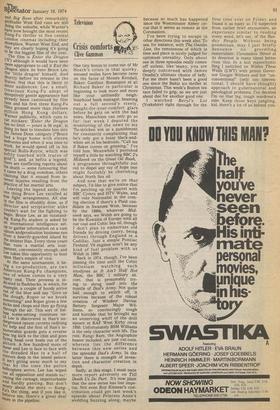Television
Crisis comforts
Clive Gammon
One tiny bonus to come out of Mr Heath's crisis is that quirky, amused smiles have become rarer on the faces of Messrs Kendall, Baker, Gardner, Bosanquet et al: Richard Baker in particular is beginning to look more and more like your unfriendly neighbourhood bank manager, beaming out a full second's steely, naught-for-your-comfort glare before he gets on with the bad news. Masochism can only go so far: last week I deputed the monitoring of the news to my 'flu-stricken son as a punishment for constantly complaining that he's only got a lousy black-andwhite set in his bedroom. "Call me if Baker comes on grinning," I've told him. Meanwhile I punished myself a little by watching BBC 2's Midweek on the Great Oil Rush, a programme throughtfully Put out to dispel any ray of hope one might foolishly be cherishing about North Sea oil.
And now that we're on that subject, I'd like to give notice that I'm patching up my quarrel with BBC Cymru and HTV Wales, and will vote Nationalist in the coming election if there's a Plaid candidate in Swansea West, because by the 1980s, whatever Midweek says, we Welsh are going to be the Kuwaitis of Europe with all our coal and Celtic Sea oil, though I don't plan to embarrass old friends by driving (sorry, being driven) through England in a Cadillac. Just a simple Pontiac Firebird: V8 engines won't be any kind of fuel problem with us Welsh in 1980.
Back in 1974, though, I've been passing the time until the Celtic millenium watching such anodynes as It Ain't Half Hot Mum, the BBC I military sit. corn, that is presumably trying to shrug itself into the mantle of Dad's Army. Not quite bad enough to switch off, it survives because of the robust creation of Windsor Davies: Battery Sergeant Major Williams, so convincingly tough and horrible that he brought me an unnerving whiff of the drill square at RAF West Kirby circa 1950. Unfortunately BSM Williams is the only character with life. The rest, Rangi Ram, the Anglophile bearer included, are just cut-outs, wherein lies the difference between this new series and the splendid Dad's Army. In the latter there is strength of invention and character creation in depth.
Sadly, at this stage, I must once more report adversely on Till Death Us Do Part. It's now plain that the new series has lost impe
tus. Not even Roy Kinnear's contribution could get last week's episode about Princess Anne's wedding buzzing along, maybe because so much has happened since the Westminster Abbey circus that it seems as remote as the Coronatiom.
I've been trying to escape in other directions this week also. To sea, for instance, with The Onedin Line, the remoteness of which in time and place is nicely judged for optimum unreality. Only about one in three episodes really comes off unless, like -many, you are deeply concerned with James Onedin's ultimate choice of lady. For me there hasn't been a good one since the Baltic ice thriller at Christmas. This week's Boston tea race failed to grip, so we are just about due for another good one.
I watched Beryl's Lot (Yorkshire) right through for the first time ever on Friday and found it as nasty as I'd suspected from earlier brief encounters, an experience similar to reading every word, let's say, of the Sunday People. Without being ponderous, may I just briefly denounce its grovelling materialism. Coronation Street at its dreariest is many times better than this. In a last masochistic fling I switched on Within These Walls (LWT) with prison Governor Googie Withers and her "unconventional" (only too conventional, I should have thought) approach to gubernatorial and penological problems. I've decided I'm on that big, tough wardress's side. Keep those keys jangling, kid, there's a lot of us behind you.


































 Previous page
Previous page